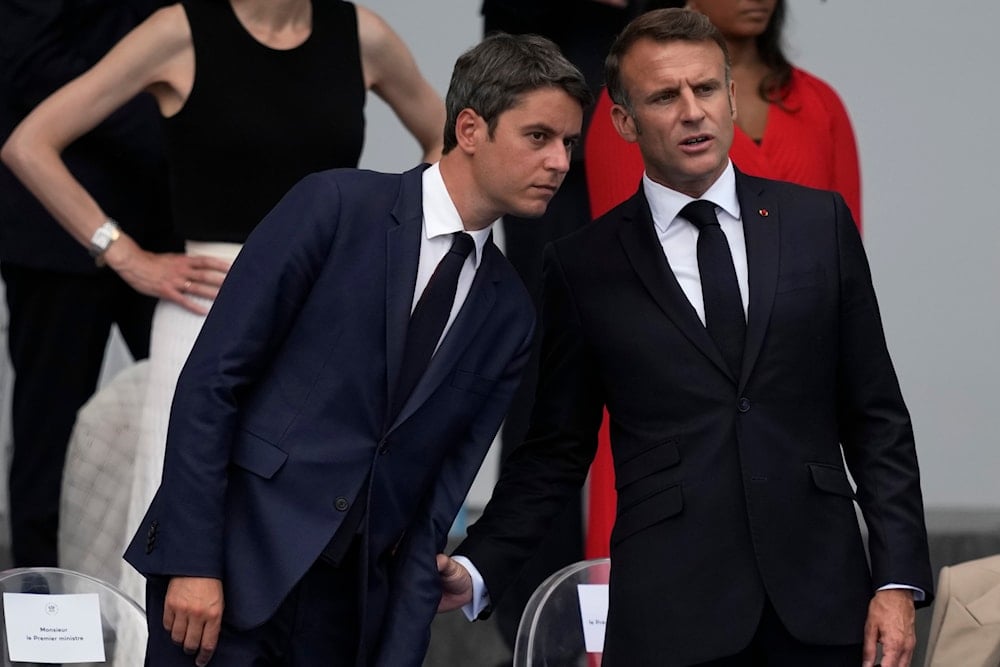France's search for PM is back to square one as hopeful quits
Hopes for France's left-wing bloc to find a consensus candidate to lead the next government after an inconclusive snap election as the top contender withdrew.
-

French President Emmanuel Macron, right, and French Prime Minister Gabriel Attal attend the Bastille Day parade Sunday, July 14, 2024 in Paris. (AP)
Hopes for France's left-wing bloc to unite behind a consensus candidate for the next government faltered on Sunday as the leading contender dropped out.
The broad alliance of Socialists, Communists, Greens, and the hard-left France Unbowed (LFI), known as the New Popular Front (NFP), holds the largest number of seats in the National Assembly after last week's election runoff. However, with 193 seats in the 577-member lower chamber, they are well short of a majority.
Despite this, the NFP claims the election result entitles them to propose their candidate for prime minister to President Emmanuel Macron, whose allies trailed in the vote.
Several days of negotiations within the coalition led to the emergence of 73-year-old Huguette Bello, a former communist MP and current president of the regional council in France's overseas territory La Reunion, as a potential consensus candidate.
Bello quickly gained the support of LFI, the Communists, and the Greens. However, the center-left Socialists continued to back their party leader Olivier Faure for the position. Facing resistance from the Socialists, Bello announced on Sunday that she would withdraw her candidacy.
Read next: Who are France's candidates for premiership?
In a statement, Bello noted the lack of consensus "among all members" of the NFP, particularly the Socialists. "Hopeful of an early agreement within the NFP, I have decided to decline without further delay the offer that I was made," she said. Bello's withdrawal sends the left-wing alliance back to the drawing board.
"There is no consensus name," Socialist Party general secretary Pierre Jouvet told AFP late on Saturday.
Meanwhile, President Emmanuel Macron ruled out a government role for either the LFI—the largest player in the New Popular Front (NFP) left alliance—or the far-right National Rally (RN) in any new coalition. Macron's allies secured 164 seats in the election, coming in second, while the RN placed third with 143 seats.
According to the constitution, Macron appoints the prime minister, who must be able to survive a confidence motion in parliament. On that note, outgoing Prime Minister Gabriel Attal is expected to submit his resignation to Macron in the coming days.
Macron urges Attal to remain in position temporarily
This comes after Macron asked Attal on July 8 to remain in his position temporarily to ensure stability amidst a hung parliament and ongoing negotiations for a new government.
Attal initially resigned on Monday morning after Macron's coalition suffered significant losses. However, Macron asked him to continue in a caretaker role to oversee governance until a stable government can be formed, citing the upcoming Paris Olympics and the need to reassure international stakeholders and financial markets.
The New Popular Front (NFP), a coalition of left-leaning parties, emerged victorious in the final round of voting, defying earlier polls that favored the far-right National Rally (RN) led by Marine Le Pen.
With 182 seats, the NFP leads but lacks an absolute majority in the 577-seat National Assembly. Macron's centrist coalition Together secured 168 seats, while the RN settled for 143.

 3 Min Read
3 Min Read








